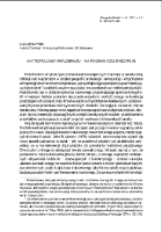Tytuł pozycji:
Antropologia krajobrazu – na pograniczu dyscyplin
The aim of my paper is to describe reciprocal influences in theoretical reflections on landscape within geography, archeology and anthropology. I draw attention to the correlation of particular approaches and to the existence of common research problems within those disciplines. Studying the phenomena on the surface of the earth using scientific methods of natural sciences, the traditional geography treated the landscape as a formalizing way of looking at the world. This approach was weakened on the one hand by the development of human geography in the 1970s, and on the other hand by new research on place and space, which integrated cultural aspects into the study of landscape. Eventually a crucial term ‘cultural landscape’ was developed. New archeologists claimed that it is impossible to maintain a universal concept of space separated from the human activity. Post-processual archeologists started to include theories and methodologies of social sciences in their research. As a result questions connected to theories of criticism, power relations, gender issues, postcolonialism were incorporated to the archeological research. It resulted in weakening of materialistic nature of the discipline and finally it allowed a systematic process oriented approach. Influenced by phenomenology and poststructuralism, archaeologists changed the research perspective. This means they abandoned the ‘external observer’ and focused on the social aspects of human relations with the earth, appreciating the importance of the subject. The landscape in anthropology was mainly used as a tool for constructing field monographs and was understood as a broad background or scene in which the life of the community took place. However the methodological changes in geography and archeology described above caused a shift in the anthropological research on landscape as well. The functionalistic and structural approach with an external and objective view of the landscape gave ground to an emic perspective. Anthropologists devoted more and more attention to the meanings that individuals attribute to the natural environment, and the landscape became a social category created by memory and dwelling, referring to the life of the insiders.
24 cm

